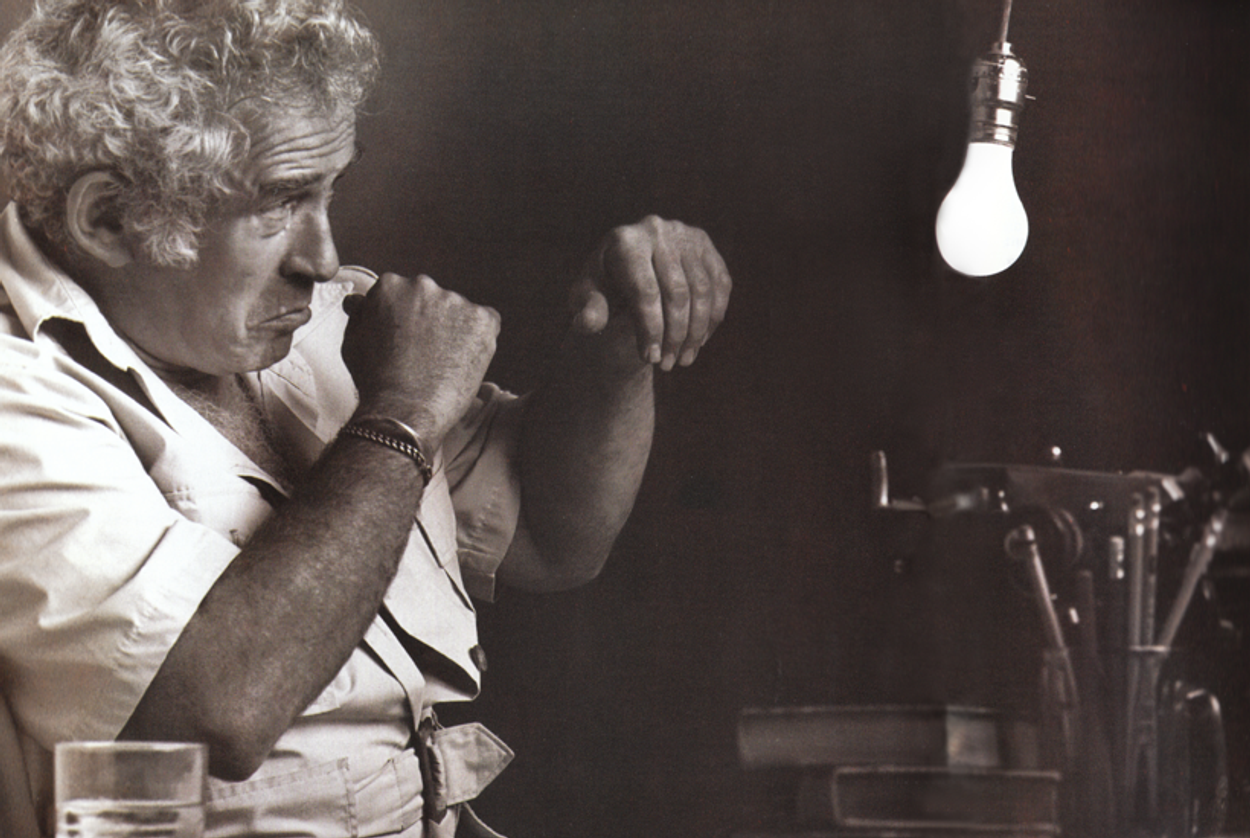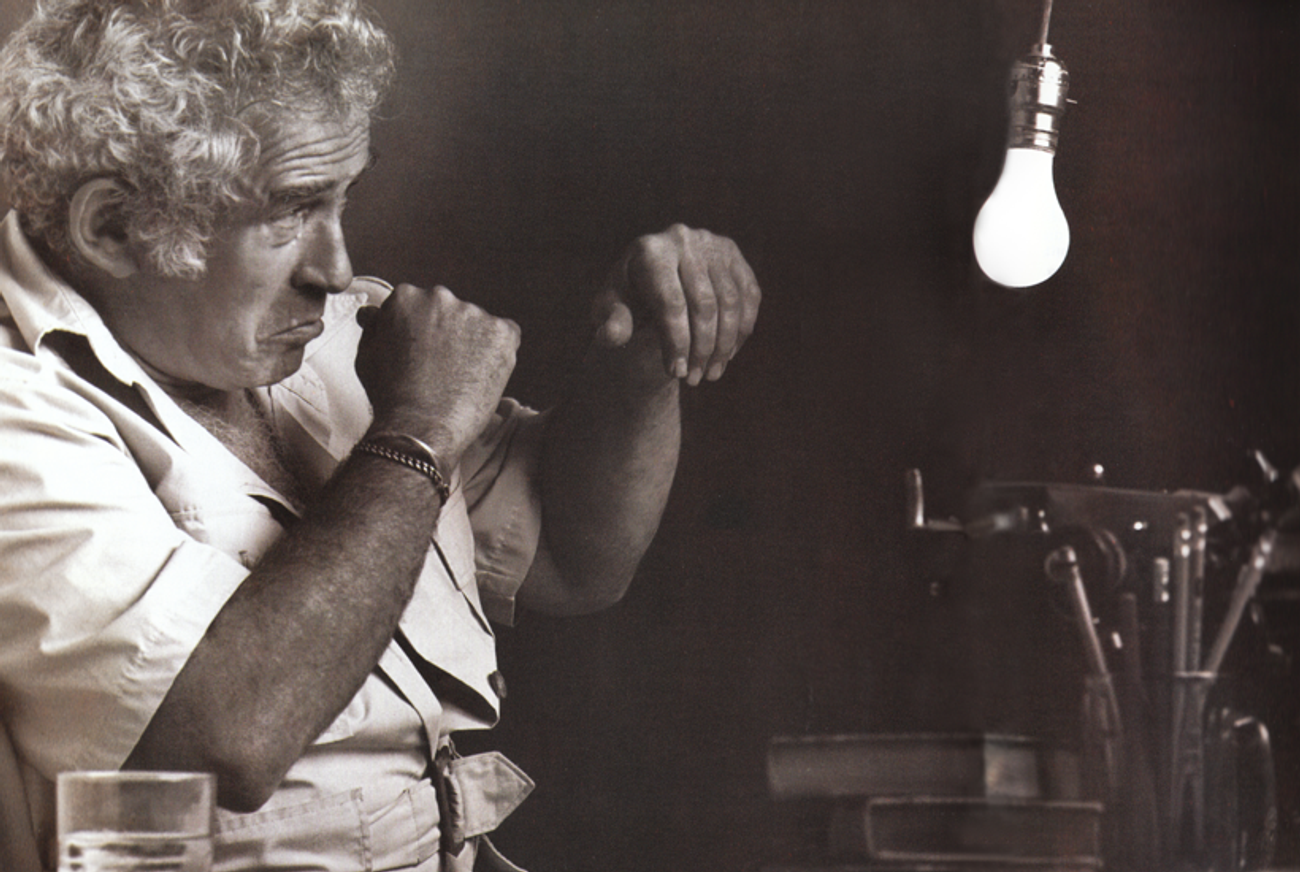The Time of His Time: Letters From Norman Mailer
The turbulent private—and public—affairs of a titanic figure in American Jewish intellectual life




“I don’t believe anyone has ever understood my relation to being a Jew,” Norman Mailer wrote in 1985. And it is true that, of all the great Jewish writers who emerged to dominate American literature in the postwar era, Mailer is the one whose Jewishness seems least central to his work. Malamud, Bellow, and Roth were all obsessed with what it meant to be Jewish, returning to the question in book after book; but Mailer was much more obsessed with what it meant to be American and what it meant to be a man. Of course, these themes are hardly absent from Bellow and Roth, either, but for Mailer, the big questions had to do with what was happening here and now—from the Pacific war in The Naked and the Dead, his sensational, best-selling debut, to the Kennedy assassination, the moon landing, the CIA, and the sexual revolution. He was less nostalgic than his Jewish peers, less keen to romanticize his childhood or ponder his roots. Yet his background was quite similar to theirs: a parochial childhood in a Jewish neighborhood—in Mailer’s case, Brooklyn—which left him with a fierce desire to break out into the wider world. For Mailer, that ambition led to a place at Harvard, followed by enlistment in the Army during World War II.
The subject of Jewishness comes up remarkably seldom in the big new book of his Selected Letters (edited by Mailer’s authorized biographer and archivist, J. Michael Lennon), which brings together some 700 letters out of the tens of thousands that Mailer left behind. Yet when it does arise, Mailer turns out to have a theory about it—naturally, since having theories, often wild and foolish, sometimes brilliant, was one of his favorite activities. “Norm Podhoretz once said, in the days when he was more interesting, that the people who best personified the manners of each culture they lived in were almost always Jews,” Mailer writes, “because once Jews went in that direction, they picked up not only the manner but the rationale behind the manner, because they had to discover the rationale first in order to make the manner work.” On this principle, Mailer’s hyper-Americanness—his insistence on going wherever the national unconscious seemed to be most troubled and active—was itself the manifestation of his Jewishness. It is because he was born Jewish that he had to figure out how to be American.
The theory, Mailer writes, is Norman Podhoretz’s, and Podhoretz is the New York Jewish intellectual who, in his belligerence and toughness, Mailer most resembles. Yet the recipient of the letter containing these musings was, of all people, Jack Henry Abbott. The Abbott case was one of many notable scandals in Mailer’s career: He was a criminal whom Mailer helped to win release, on the strength of his prison writings, and who then immediately committed a murder. The blot of Mailer’s reputation was permanent. Here was a classic example of an irresponsible intellectual, putting literature above common sense and responsibility, playing with fire and getting burned. Yet these reflections on Jewishness were written to Abbott in 1985—that is, four years after his release, crime, and reincarceration. Mailer’s willingness to continue his friendship with Abbott is a sign of one of his signal traits, loyalty. The letters show him maintaining certain relationships over many decades, and he would have considered it unmanly to give up on a friend just because the man had caused him trouble, or even because he was a criminal. Only when Abbott finally grows monomaniacal and insensible to reason does Mailer give up writing to him.
The names of Jack Abbott and Diana Trilling could never be placed together, without Mailer serving as the ampersand; yet it is in a 1960 letter to Trilling that Mailer gives the other longest explanation of what Jewishness meant to him. As a writer, Mailer grants, he lacks “definition,” he is given to posturing and role-playing. Yet “it must be remembered,” he insists, “that he is a Jew and that being a major novelist is not a natural activity for a Jew.” (Note the passing insistence that what he is is a “major” novelist—a certainty that may, of course, conceal a deep insecurity.)
Mailer goes on to sketch an ambitious theory of the history of the novel, according to which the classic 19th-century novel was devoted to the “roots” of society: “the novel came into existence … as the avatar of society at the moment society developed roots too subtle for the historian to trace.” At this stage, however, the Jews of Western Europe were only recently emancipated; they had no deep social roots, and so they were unable to be either the heroes or the authors of novels. Major Jewish novelists could not emerge until after WWII, because by then “the Twentieth Century had ripped up all the roots.” The Jew, in his homelessness and insecurity, was now a representative figure: “he never had the genteel security of relaxing in a habit … the Jew was always a bloody schizophrenic, his parlor manners greasy and his aspiration incandescent. … But now the world was schizophrenic. H-bombs and PTA committees. The Jew—those who were left—could be the first to swim the divided waters.” Mailer saw himself as especially gifted because of his contemporaneity, his ability to experience the present fully: “I was psychopathically marooned in the present.”
The word “psychopathically” suggests that Mailer’s gift came at a high price, and reading the Selected Letters, it is clear that his need for freedom made for a turbulent private life. The letters function as a kind of speeded-up biography, in which wives come and go at a breakneck pace, hardly distinguishable from one another, and children pile up haphazardly in the corners of his consciousness. (Letters in which he refers to his baby son as a “prick” and his young daughters as “cunts” are meant to be tough-guy-affectionate, but sound creepily hostile and estranged.) Not until the letters to his last and longest-serving wife, Norris Church Mailer, do we get a hint of the charm and flourish that made stubby, aggressive Mailer so irresistible to (some) women:
Sometimes when we’re fucking, or even when just holding you, I can close my eyes and feel you as a rich red presence in my arms, and of course I don’t mean just your hair but your aura. It’s as if orange and red and fine rose-red waves come off your heart, and at such times I see into your emotions and feel a little awe at what we are getting into for it’s a true woman I’m holding then, as big as her heat and her love for me could grow to be as strong as fire and as wrathful if I ever betray it.
This kind of pumped-up rhapsody is not to everyone’s taste, but it benefits from Mailer’s unembarrassability—the same rhetorical inflation and head-on mythologizing that you find in his best prose. Mailer seldom writes letters about strictly literary matters, but one issue that he returns to over and over again is the difference between first-person and third-person narration. To write in the third person, he believes, the novelist needs a comprehensive worldview, “be it right or wrong, simple or complex. Without that, it becomes almost impossible to feel your material, dominate it, what have you.” To write in the first person, on the other hand, the writer only needs “one person’s perceptions,” his own.
This dichotomy suggests that third-person, omniscient narration is mature and comprehensive, while first-person narration is immature and intense. So, it must have been with some frustration that Mailer came to realize that his first-person writing was much more commanding. His novels are seldom read today—the most popular probably remains the first, The Naked and the Dead, but when was the last time you heard somebody talk about Barbary Shore or Ancient Evenings? It is his nonfiction, with its oversized authorial persona, that had a huge influence and remains alive: Advertisements for Myself, The Armies of the Night.
The letters show that Mailer’s turn from fiction to journalism was driven by two needs: the need to make money, to pay his many alimonies and child support bills, but still more the need for attention, for fame. The early phase of Mailer’s career had a strange and discouraging shape. The Naked and the Dead was a critical sensation and a huge best-seller, making Mailer rich and famous; then his next two books, Barbary Shore and The Deer Park, were enormous failures. The critical hostility that greeted Barbary Shore, in particular, scarred Mailer for life: “The book came out last Thursday and received on the whole extremely bad reviews, far worse than I ever anticipated,” he wrote to Beatrice Silverman, his first ex-wife, in 1951. “The thing would be shocking if it weren’t so funny.” But it wasn’t really funny at all, and for the rest of the 1950s Mailer struggled to regain his mojo. He found it not in fiction, but in essays—the landmark, deeply appalling “The White Negro” in 1957, then the confessional sections of Advertisements for Myself in 1959.
The latter also featured the taboo-breaking story “The Time of Her Time,” a prolonged sex scene in which a man triumphantly gives a woman her first orgasm. One of the themes of Mailer’s career, as seen through the letters, is his constant pushing back against the standards of good taste and/or censorship. As early as The Naked and the Dead, he fought his editors to keep profanity (or at least the word “fug”) in the book. With “The Time of Her Time,” he circulated the story before publication to a group of critics and writers, asking their opinion as to whether it was obscene, in case it had to be defended in court. Yet the way the story treats sex as a kind of masculinity-challenge, an Olympic-level sporting event, now feels absurd and a little damning.
Indeed, the letters are sprinkled with Mailer’s admiring or boasting references to fistfights, bullfights, boxing matches, even kayaking—Hemingwayesque tests of manhood, which make you wonder why Mailer felt he had so much to prove. His friendship with Abbott and other convicts, and even the worst single act of his life—the stabbing of his second wife, Adele, at a drunken party—seems like a continuation of this need to prove that he was equal to the darkest human experiences. Yet seeking out darkness in this way seems almost boyish, for it suggests that Mailer did not take evil quite seriously. Perhaps that is why, for all the glamour and excitement of the Letters and the life they document, it is hard to take Mailer himself quite seriously today.
***
In 2007, shortly before his death in November of that year, Norman Mailer spoke to Tablet magazine’s predecessor, Nextbook. The interviewer was Nermeen Shaikh, and they spoke about his obsession with Hitler, the great ruthlessness of Texas Hold ’em, and his grandfather the butcher. Listen here:
***
Like this article? Sign up for our Daily Digest to get Tablet Magazine’s new content in your inbox each morning.
Adam Kirsch is a poet and literary critic, whose books include The People and the Books: 18 Classics of Jewish Literature.
Adam Kirsch is a poet and literary critic, whose books include The People and the Books: 18 Classics of Jewish Literature.